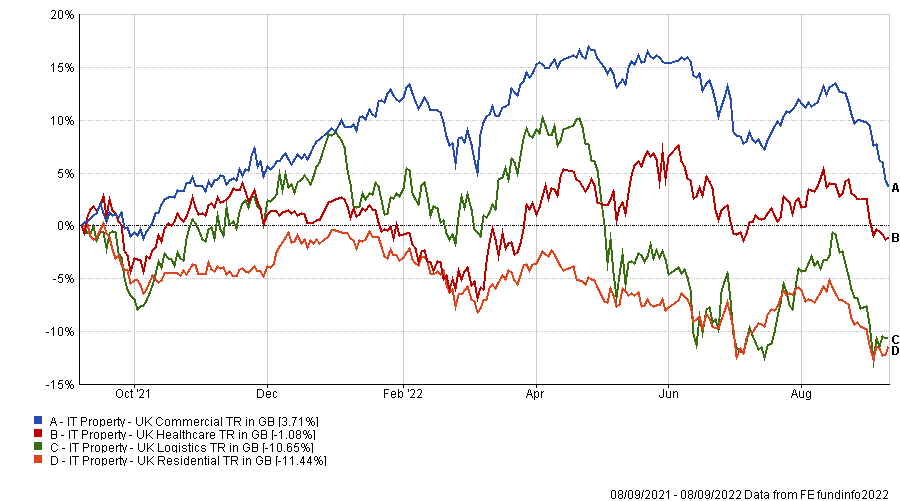Investors have been buying back into the formerly beleaguered property sector to protect their capital from inflation, but some real estate sectors might be more attractive than others.
They have been doing so in the hope that the asset class can also provide diversification in an economic backdrop where performance of both equities and bonds has been disappointing.
While property does act as an inflation hedge, according to Marcus Phayre-Mudge, fund manager at TR Property, it is only to an extent.
“What is heavily inflation-proof is the income that comes from a well-constructed property portfolio. This is why the vast majority of our income is linked to national inflation, meaning the vagaries of central bank decisions are reasonably neutral for us,” he said.
This is particularly relevant as the Bank of England and other central banks around the world have started to tighten the screw on inflation and raise interest rates.
But property is a vast asset class and returns varied wildly among the relevant Association of Investment Companies (AIC) sectors. Commercial, for example, generated a 3.7% return over one year, while residential lost 11.4%, as illustrated in the line chart below.
Performance of AIC property sectors over 1 yr

Source: FE Analytics
Below, experts shared their views on which real estate sectors are worth considering.
Commercial
Looking at the traditional real estate areas, investment manager and director at GDIM, Tom Sparke, said: “I would be hesitant to hold a significant overweight, as many of these will be cyclical and may suffer in a recession, which looks likely in many places.”
“That said, employment remains strong, so the expected recessionary dip in office demand may not be so pronounced in this cycle.”
Ryan Hughes, head of investment partnerships at AJ Bell, also agreed that investment in commercial property could be seen as riskier than usual.
“Given the pressures that many tenants will come under that may leave them unable to pay their rent, for those still wanting property exposure, a focus on more secure areas could be beneficial.”
One of these areas, he said, is supermarkets. Here, his pick was the £1.8bn Supermarket income REIT, which yields nearly 5% from owning 26 supermarkets across the country. It is a popular choice and currently trades on a 7% premium, “demonstrating that other investors recognise the reliability of its income in the challenging times to come”.
“Despite the economic challenges, it seems highly likely that supermarkets will prove to be more resilient than other elements of retail and therefore the rental income from them looks solid,” he said.
Healthcare
Healthcare is another sub-sector which provides an effective inflation hedge, according to Michael Gobitschek, portfolio manager of Skagen.
“Properties typically have long leasing contracts of around 20 years that are inflation-adjusted annually while demand is structurally strong due to their societal importance and resilient to the economic cycle,” he said.
In this space, AJ Bell’s Hughes highlighted the Impact Healthcare REIT, with its portfolio of real estate assets including residential and nursing care homes.
“Notably, nearly two thirds of the rental income is paid by local authorities, giving a very stable foundation to the income of the trust while all of the properties in the trust also have index-linked leases which could be very appealing if inflation stays higher for longer.”
The £500m investment trust offers a yield of nearly 6%, which will be attractive to income seekers.
Residential
William Scoular, head of private client lending at Investec Real Estate, said that while rising interest might further dampen demand in certain parts of the property market, “we expect the residential sector to remain robust, underpinned by the continued imbalance of demand outstripping supply”.
GDIM’s Sparke confirmed that residential housing “is investable and provides excellent diversification from equities and bonds, although the returns are not hugely generous”.
For Gobitschek, landlords need to strike a balance between rates and occupancy, particularly in segments where tenants may be challenged by the economy slowing down such as retail and office.
“Areas such as self-storage currently offer a better inflation hedge as landlords can increase rents quickly and more aggressively because demand is strong and less economically sensitive while costs are relatively fixed,” he said.
Social housing
Lastly, there are also opportunities for inflation-linked income in social housing, which is supported by government funding and for which there is an undersupply, said Steve Windsor, principal and co-founder of Atrato Group.
“This sector also offers a clear social benefit in supporting the provision of appropriate housing for vulnerable individuals. Finding government backed inflation linked cashflows that can be sourced at a pick-up to index linked gilts has become somewhat of a holy grail for inflation savvy investors.”
“Should inflation tides remain elevated for the foreseeable future, those investors who cling to the assets that outperformed in the past may find themselves ill-equipped to navigate the potential choppy waters ahead. To weather this inflation storm, investors should recognise that the next period of the investment cycle will likely favour fundamental investing and real assets,” he concluded.





